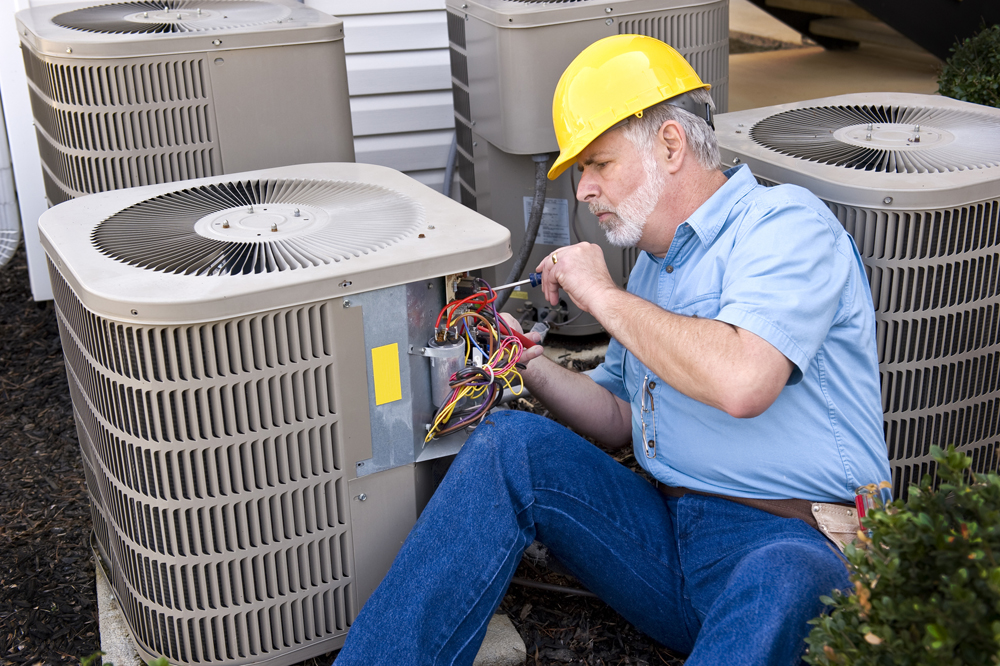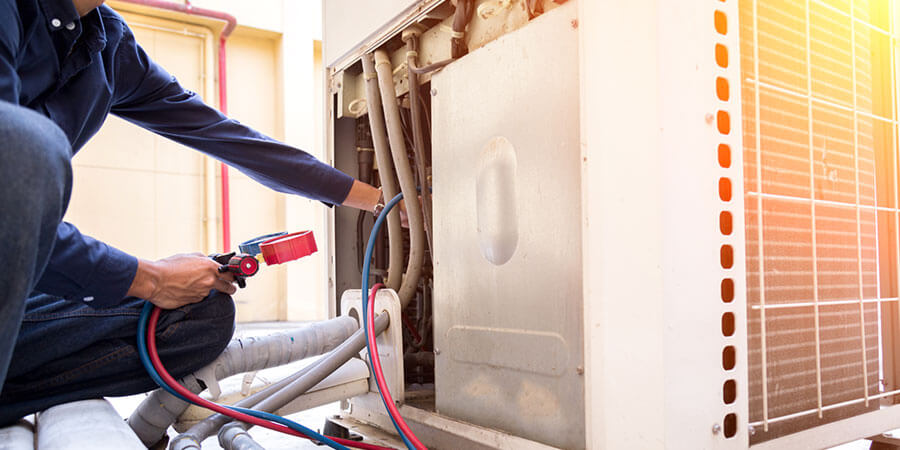Choosing the Right Time for furnace replacement
Picking Between a Warm Pump and Heater: Key Factors To Consider for Your HVAC Demands
When examining heating options for cooling and heating needs, the decision between a warm pump and a heating system can be complex. Each system provides distinct advantages tailored to specific environments and power effectiveness goals. Comprehending these differences is important for making an enlightened selection. Secret elements such as installment costs and ecological impact even more make complex the option procedure. Which alternative truly straightens with one's convenience and sustainability preferences? The adhering to sections will explore these factors to consider carefully.
Recognizing Warmth Pumps: Exactly How They Function and Their Advantages
While several homeowners take into consideration numerous home heating alternatives, understanding just how heat pumps feature and their advantages can greatly affect their decision. Warmth pumps run by transferring warmth instead of producing it. In the winter, they extract heat from the outdoors air or ground and transfer it indoors, while in the summer, they reverse this process, cooling down the home by expelling warm outside. This twin performance makes them flexible for year-round environment control.One of the primary benefits of heatpump is their power efficiency. They make use of significantly less electrical energy compared to traditional heating unit, potentially resulting in reduced energy costs (ductless mini splits). Furthermore, heatpump have a smaller carbon impact, making them an eco-friendly selection. They also need much less maintenance than standard systems, adding to long-term price financial savings. On the whole, comprehending the auto mechanics and benefits of heat pumps can aid homeowners make educated decisions concerning their heating and cooling down demands
Exploring Heating Systems: Kinds, Procedure, and Benefits
Heaters can be found in different kinds, consisting of gas, electrical, and oil designs, each with unique operational systems. Comprehending these distinctions is important, as they affect efficiency and heating performance. Additionally, furnaces provide various benefits, such as consistent heat output and reliability in colder environments.
Kinds of Heaters
Furnace can vary considerably in design and operation, with heaters being a preferred selection among property owners. There are several types of heaters, each making use of different fuel resources and innovations. Gas heating systems are common, leveraging natural gas to produce warm efficiently. Electric heaters, on the various other hand, utilize electrical resistance to produce warmth, often preferred for their uncomplicated installation. Oil heaters, while much less common, work in areas with minimal gas gain access to (furnace replacement). Additionally, condensing heaters make the most of power effectiveness by recycling and catching exhaust gases. Each kind operates with a system of heat exchangers and ductwork to distribute cozy air throughout a home. Understanding the differences in between these heating system kinds is necessary for informed a/c choices
Benefits of Heating systems
For homeowners looking for reliable warmth throughout cold months, the benefits of heating systems are substantial. Furnaces supply regular heating, making sure also temperatures throughout the home. They are specifically reliable in extreme chilly, frequently exceeding warmth pumps in freezing conditions. Numerous kinds, consisting of gas, electric, and oil furnaces, provide versatility to fulfill varied demands and preferences.Furnaces additionally tend to have lower initial setup expenses compared to warm pumps, making them a much more obtainable alternative for many. Their durable layout adds to a much longer life-span, with lots of devices lasting over 15 years with correct upkeep. Furthermore, contemporary heating systems are commonly equipped with sophisticated innovation for enhanced efficiency, which can lead to reduced power costs. On the whole, furnaces remain a dependable selection for effective home heating.

Energy Performance: Comparing Warmth Pumps and Furnaces
When comparing energy performance in between heatpump and heating systems, the Seasonal Power Efficiency Ratio (SEER) plays a vital duty in figuring out performance. Furthermore, a functional expense analysis exposes the long-term financial ramifications of each system. Comprehending these factors can lead house owners in making educated decisions regarding their home heating services.
Seasonal Power Efficiency Proportion
Power performance plays an important duty in the decision-making process between heatpump and furnaces, particularly when considering the Seasonal Power Performance Ratio (SEER) This statistics procedures the cooling effectiveness of heatpump over an entire cooling period, supplying a standardized means to assess efficiency. Higher SEER scores show better power performance, translating to reduced power consumption and lowered utility costs. On the other hand, heaters are normally examined utilizing the Yearly Gas Utilization Performance (AFUE) ranking, which shows heating performance. When contrasting these 2 systems, property owners ought to focus on SEER scores for heat pumps, as they straight influence total energy financial savings and ecological sustainability. An extensive understanding of SEER can especially affect the lasting contentment and cost-effectiveness of the selected heating and cooling remedy.
Functional Cost Evaluation
Understanding the operational expenses associated with heatpump and heaters is essential for property owners examining their options. Warmth pumps normally provide greater energy performance, converting electric energy into warmth with marginal waste. This leads to lower regular monthly energy expenses, specifically in moderate environments. Alternatively, conventional heating systems, particularly gas designs, may have lower ahead of time costs yet can incur greater operational expenditures gradually due to fuel rates and performance ratings.Moreover, heat pumps can work as both home heating and cooling systems, possibly reducing the requirement for different a/c units. While preliminary financial investments for heatpump may be higher, their long-term financial savings in energy performance can make them a much more cost-effective choice for numerous houses. Cautious evaluation of regional power rates is important to figure out the most effective alternative.
Installment Costs: What to Expect for each and every Heater
Setup expenses for heater can vary considerably in between see this website warm pumps and heaters, affecting home owners' decisions. Heat pumps normally have greater ahead of time setup costs, commonly ranging from $3,500 to $8,000, depending upon the unit dimension and complexity of installment. This includes the outdoor unit, indoor handling system, and required ductwork alterations. On the other hand, heating systems often tend to have reduced preliminary costs, averaging in between useful site $2,500 and $6,000, which can be appealing for budget-conscious house owners. Nevertheless, installation expenses can increase if comprehensive ductwork is required.Moreover, the option of gas type for heating systems-- gas, gas, or electrical-- can likewise impact setup prices. While heatpump use power performance, their first financial investment may deter some customers. Inevitably, examining installation costs alongside long-term cost savings and effectiveness will aid homeowners in making notified decisions concerning their heater.
Climate Factors To Consider: Which System Performs Better in Your Area
How do climate problems influence the performance of heating unit? The performance of heat pumps and heating systems can differ considerably relying on the neighborhood environment. In moderate environments, heatpump stand out by efficiently moving heat from the outdoors air, making them an energy-saving alternative. Their efficiency diminishes in exceptionally chilly temperatures, where they may have a hard time to remove adequate warm. Alternatively, heaters, particularly gas versions, provide constant and reputable warmth despite exterior conditions, making them more effective in chillier regions.In locations that experience milder wintertimes, warm pumps can operate successfully year-round, offering both heating and air conditioning. On the other hand, areas with harsh winters months typically profit from the toughness of heating systems. Inevitably, comprehending the regional climate is essential when choosing in between a heatpump and a heating system, as it straight impacts their operational efficiency and overall efficiency.
Upkeep Demands: Long-Term Take Care Of Heat Pumps vs. Furnaces
While both heatpump and furnaces require regular maintenance to assure peak efficiency, their details needs and care routines vary substantially. Heaters commonly need less frequent focus, with annual evaluations being adequate to look for gas leakages, clean filters, and evaluate overall capability. Their less complex layout typically enables uncomplicated repairs.In contrast, heatpump necessitate biannual maintenance because of their twin duty in cooling and heating. This consists of cleaning coils, examining cooling agent levels, and guaranteeing that both the outdoor and indoor systems work at their ideal. Additionally, warm try here pump upkeep usually involves even more detailed components, making specialist servicing essential.Neglecting upkeep can bring about diminished effectiveness and raised energy costs for both systems. Ultimately, property owners need to take into consideration these long-term care needs when picking in between a heatpump and a heater, as aggressive maintenance can extend the lifespan and efficiency of either system considerably.
Environmental Effect: Picking a Sustainable Home Heating Alternative
The ecological impact of heating unit is an important analysis for house owners looking for sustainable alternatives. Heatpump are generally a lot more energy-efficient than conventional heaters, as they transfer warmth instead than generate it, considerably reducing carbon emissions. By utilizing renewable resource resources, such as air-source or geothermal heatpump, property owners can further decrease their environmental footprint.On the other hand, natural gas heaters give off greenhouse gases and add to air contamination, though they frequently provide greater warm output. However, advancements in technology have actually caused the growth of high-efficiency heating systems that lessen emissions.Ultimately, selecting a heater includes evaluating efficiency against environmental impact. Homeowners are urged to reflect on local energy resources and rewards for sustainable systems, making certain an option that straightens with both individual comfort and environmental duty. The choice affects not only immediate comfort but additionally long-term sustainability and ecological health.
Regularly Asked Concerns
The Length Of Time Do Heat Pumps and Furnaces Generally Last?
The life-span of heatpump usually varies from 15 to two decades, while heating systems can last between 15 to 30 years. Regular maintenance significantly affects their durability and performance in supplying home heating remedies.
Can I Make Use Of a Warmth Pump in Extremely Cold Climates?
Heat pumps can run in very chilly environments, however their performance reduces as temperatures drop. In such conditions, supplemental home heating resources might be needed to keep comfy indoor temperatures and assure peak performance.

What Is the Sound Level of Heat Pumps Versus Furnaces?
The noise degrees of heatpump and heating systems vary substantially. Usually, heatpump operate even more quietly than traditional heaters, making them more effective for those conscious appear, while heating systems might create louder operational noises throughout heating cycles.
Are Warm Pumps Suitable for Both Heating and Air conditioning?
Heat pumps are without a doubt appropriate for both cooling and heating (heat pump replacement ooltewah tn). They function by moving warm, providing effective temperature control year-round, making them a versatile option for property owners looking for an all-in-one a/c option
What Size Heater Do I Required for My Home?
Identifying the appropriate dimension furnace for a home needs evaluating aspects such as square footage, insulation high quality, neighborhood climate, and the home's design. Consulting a specialist can guarantee a precise evaluation and excellent comfort. Warm pumps typically provide greater power performance, converting electric energy right into warm with marginal waste. In moderate climates, warmth pumps excel by effectively moving warmth from the outdoors air, making them an energy-saving option. On the other hand, heaters, specifically gas models, offer trusted and consistent warmth no matter of outdoor conditions, making them more suitable in colder regions.In areas that experience milder winter seasons, warm pumps can operate successfully year-round, supplying both home heating and cooling. Warmth pumps are typically much more energy-efficient than standard heaters, as they move warm rather than produce it, significantly minimizing carbon discharges. By using sustainable energy sources, such as geothermal or air-source heat pumps, property owners can even more reduce their ecological footprint.On the other hand, all-natural gas heaters send out greenhouse gases and add to air pollution, though they typically offer higher warmth result.